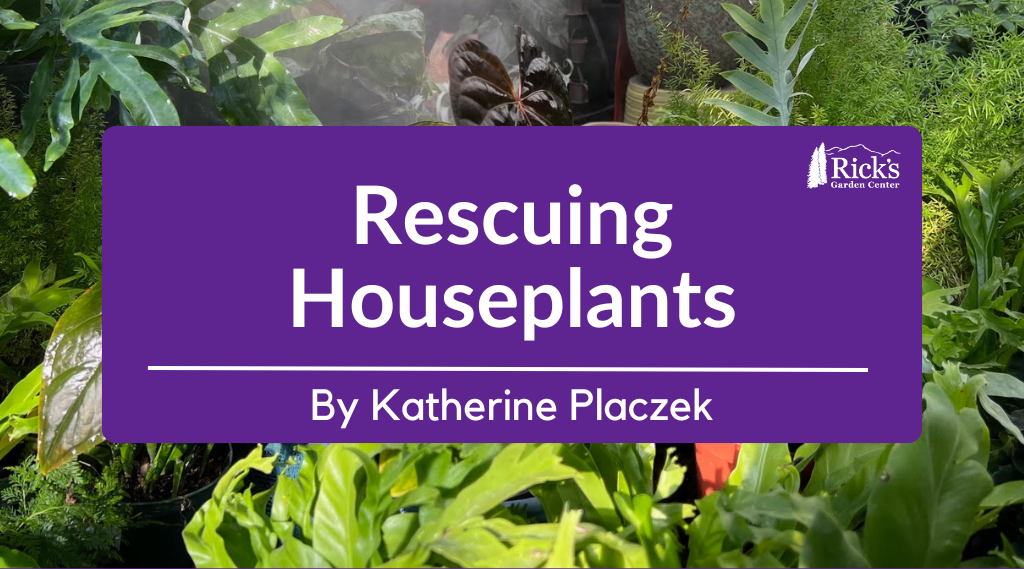Rescuing Houseplants
Listen…shhhhh…if you listen closely, you can hear that neglected plant in the corner crying for help. You did not mean to cause harm. Whether you left for your holiday travels in a rush and failed to give your plants some extra TLC before you left, or you do not know the plant’s needs, the stress is equally killing you. You are at the point of not knowing what to do to make your plants happy again. No worries! We got you.
First:
Get nerdy. Pretend you are a scientist. Observe the plant. See what its symptoms include. What is it trying to tell you? Do research by using reference guides. We recommend The Plant Rescuer: The Book Your Houseplants Want You to Read by Sarah Gerrard-Jones (available at the Pikes Peak Library District). This book has helpful decision trees that will help you decipher your plant’s calls for help. Also, feel free to search the web on general care for your species of plant. Cross-check with multiple sources, so you are getting good and correct information on what your plant needs. Academic sources and search engines, like Google Scholar, are excellent places to find accurate knowledge. And plant communities on Reddit surprisingly are always insightful. Feel free to bring photos to us, and we can help diagnose what is occurring!
Second:
Based on the initial sleuthing you did through observation, reference books, internet searching, and inquiry, come back to the plant. Address the habitat first. Habitat includes light, moisture, heat, and humidity. Is your cactus in a dark corner? Is your Norfolk pine crisping up because it is in direct sun? How about moisture? Does your plant look like it is dehydrated, and needs a drink? Or conversely, has it seen too much water and would love to dry out its feet? Is your plant feeling a chill because it’s by a cold window? Or is it dropping dry leaves because it is in proximity of a heater vent? Some plants do not want to be drenched with water, but like the daily mist of a shower, a spritz of a spray bottle, etc. Are you giving those plants the humidity they need? If you have adjusted the habitat of the plant to fit its individual needs, and still do not see improvement in 7-14 days, move on to the next tier of help.
Third:
This next tier of inquiry is about pests, plants that are rootbound, and fertilization. Typically plants that were left for themselves for a couple of days and look sad will not need help from this stage of help. Plants that have fended for themselves for weeks while you were working on that big project, or you have mistakenly overwatered several times, or are just ready to go to a larger home are typically when you will see any of these concerns.
Pests come in all shapes and sizes. The most common pests you will encounter are house gnats, white flies, aphids, thrips, mealybugs, and scale. Another pest that occasionally shows up is various fungi. Some of these concerns are easy to get rid of, and some are extremely difficult. While this article does not have the space for the breadth of how to address each of these species, you should consult your resources (like The Plant Rescuer, or give us a call!).
Rootbound plants may present as under-watered but are typically not happy even after you have watered them. Check for roots poking out of the bottom of a drainage hole, or pull the side of the soil away from the pot to see if roots have encircled the base of the pot. If the plant is rootbound, up the pot to a container 2 inches wider than the current size.
Finally, nutrients may be what your plant is asking for. A nutrient deficiency can present as yellowing leaves, absence of blooms (as an example, begonias typically need fertilization to bloom), slowed growth, or languishing properties. Find a fertilizer that will suit your plant (cacti and succulents do not need a whole lot of fertilizer, so do not go straight for the all-purpose 20-20-20.) If you are not sure that your plant needs fertilizing, start with a diluted or lesser amount than advised on the container. You can always make a situation worse.
If at any point you lose a plant along the way, know it happens to the best of us. Take heart, there are other plants out there, and this is not an indication of your skill level as a plant person. Part of the journey is losing plants occasionally, sad as it is. Say last rites, find a peaceful resting spot for the plant (the compost is a nice spot), and fill the empty corner with a new plant friend. If it is too soon for that, take the time you need. We will be here when you are ready. Peace, Love & Plants.

Back to Blog